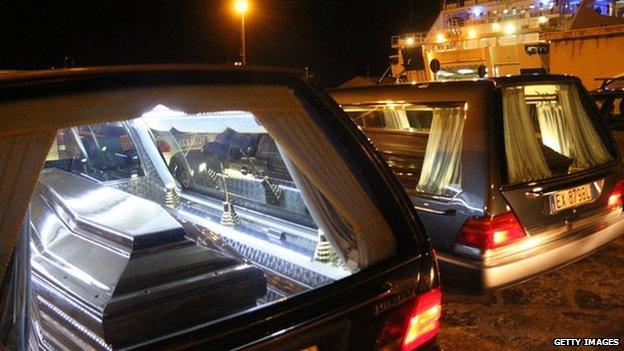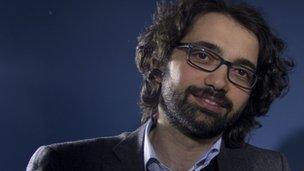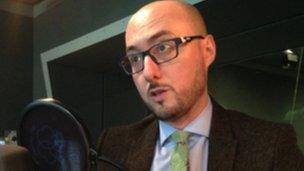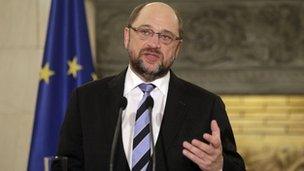Can Europe stop migrants dying in the Mediterranean?
- Published

The coffins containing bodies of immigrants who died were taken to Porto Empedocle in Sicily
More than 3,000 people are estimated to have died in the Mediterranean Sea last year. The Pope has warned the waters are in danger of becoming "a vast cemetery".
People smugglers have been described as the most ruthless travel agents on the planet and the Italian Navy rescue mission has been downsized among claims that helping migrants at sea creates a "pull factor".
What could European countries do to stop these deaths? Four expert witnesses give their perspective with the BBC World Service's The Inquiry.

Andrea di Nicola: Demand is high for 'ruthless travel agents'
The Italian criminologist and author spent two years travelling around Africa and the Middle East speaking to smugglers.

Andrea de Nicola says Europe faces a huge battle against the smugglers
"When we interview and spend time with the smugglers, they were almost laughing at Europe saying 'You cannot stop this. If you try and stop this, if you close your border I will earn more, my prices will increase.' This is what they told us."
Some smugglers pack migrants into unseaworthy boats in the face of winter storms. Others have sent a freighter packed with people on autopilot towards the shore.
"Travelling by sea can be the cheapest way into Europe, but a better class of service can be bought.
"A Turkish smuggler made his clients enter Italy on yachts with two or three skippers and they were full of Afghans and Syrians. They were sailing through the Mediterranean Sea during spring time or summer time. It was less risky and more costly for them.
"The price paid [by migrants] was something like 7-8,000 euros for each person."
Large, sophisticated networks stretching across continents, comprising thousands of individuals will be hard to stop.
"They trust each other. They work together. They are more capable of co-operating among each other in a criminal system than we are among countries of the European Union. This is incredible.
"It's essential [for the EU] to co-operate in terms of judicial and investigative co-operation. For instance, the co-operation with Turkish authorities should be boosted in order to make the life of the smugglers more difficult."

Professor Alessio Patalano: 'Italy's dilemma'
The visiting professor at the Italian Naval War College says Italy's now-defunct operation Mare Nostrum (Our Sea), which saved thousands of lives, should be reinstated and funded by European countries.

Prof Alessio Patalano says Italy's rescue model should be adopted by the EU
In October 2013, an Italian fisherman and his crew rescued 155 migrants from the sea near the island of Lampedusa when their boat capsized. Some 368 died.
The Italian government set up operation Mare Nostrum (Our Sea) to patrol and save lives in the Mediterranean.
"It was something that was popular in terms of the broader public and even within the political corridors in Italy, it's something that touched pretty much everybody.
"The military deployed planes, helicopters, submarines and destroyers to find and pull people out of the sea.
"The mission was pretty clear really. We should try very hard to prevent further disasters of this kind from happening at sea.
"What Mare Nostrum presented to them was a scale of humanitarian crisis that went past the standard numbers that you would deal with if you were in the Italian Navy."
The Italian Navy and Coastguard expected to save about 3,000 people a year.
"There is nothing in the recent history of the Mediterranean that would suggest in that year you had 156-157,000 people rescued at sea.
"There is absolutely no precedent in that sense, in terms of scale, the impact, the costs and the ability to meet the challenge."
The £10m a month cost of Mare Nostrum was too much of a strain on Italy's naval budget. It turned to Europe for help. In response, the EU launched Operation Triton which has a budget a third the size.

Forensic anthropologist Robin Reineke,: 'Shifting the problem creates more deaths'
The forensic anthropologist is the Executive Director, Colibrí Center for Human Rights and works on the Mexican/US border tracking migrant deaths. She says using geography - like the desert, or the sea - to deter migration does not work. Desperate people will try to make the crossing however dangerous it is.

Robin Reineke says changing strategies bring different issues.
"In 1994, the border patrol under the Clinton administration shifted strategy. It was known as 'prevention through deterrence' and was predicated on this idea that if people got to the border wall and they saw how difficult it would be, they wouldn't try."
Borders in El Paso, San Diego and Arizona were strengthened. The reaction from migrants was to find another way to cross.
"Essentially, would-be migrants were pushed into the very, very remote mountainous and arid parts of Arizona. In the early 2000s we saw a rapid, tragic increase in the number of fatalities in southern Arizona in the span of just a couple of years.
"Prevention through deterrence has not been a strategy that's been successful in deterring people. Unfortunately it's led to the deaths of thousands of people but it has not had an impact on the flow of unauthorised immigrants across the US-Mexico border."

President of the European Parliament Martin Shulz: 'We need a proper structure'
The president of the European Parliament says Europe needs to increase the humanitarian effort, but a political solution is needed in the long term.

Martin Schulz, president of the European Parliament, says a new system must be introduced
"We need a complete new system of migration. Fifty per cent of all refugees are going to five member states of the European Union, which has 28 members.
"So what we need first of all is what we call 'burden sharing'. All member states of the European Union must contribute to manage this problem of refugees."
He says one way to reduce the number of people who die trying to get into Europe illegally is to make it easier for them to do so legally.
"We need rules for access to the European Union. Who will take how much quota of immigrants and which kind of immigrants get access to the European Union.
"This is for sure the better way than to allow illegal uncontrolled immigration."
Mr Schulz understands it is a hard political sell but argues national governments must be honest with their citizens.
"The question is: Is a government obliged to tell its citizens what they want to hear or what is the real need to explain?
"The Europeans must understand that we are in the beginning of a major change in the structure, not only of Europe, but the world as a whole with a lot of migration.
"People in this global world are moving and they will move also to Europe."
The Inquiry is broadcast on the BBC World Service, on Tuesdays from 13:05 GMT. Listen online or download the podcast.